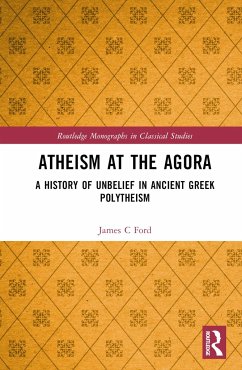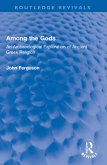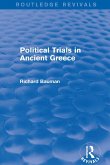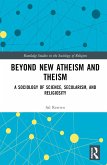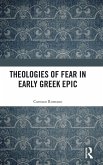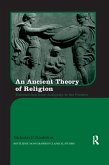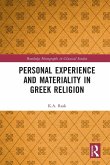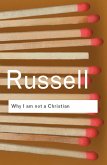This fresh, comprehensive study of ancient Greek atheism aims to dismantle the current consensus that atheism was 'unthinkable' in ancient Greece, demonstrating instead that atheism was not only thinkable but inextricably embedded in the Greek religious environment.
Through careful analysis of a wide range of source material provided in modern English translation, and drawing on philosophy, theology, sociology, and other disciplines, Ford unpicks a two and a half thousand-year history of marginalisation, clearing the way for a new analysis. He lays out in clear terms the nature and form of ancient Greek atheism as the ancient Greeks conceived of it, through a series of themes and lenses. Topics such as religious socialisation, the interaction of atheist philosophy and theology, identity formation through alterity, and the use of atheism in scapegoating are considered not only in broad terms, using a synthesis of modern scholarship to mark out an overview in line with modern consensus, but also by drawing on the unique perspective of ancient atheism Ford is able to provide innovative theories about a range of subjects.
Atheism at the Agora is of interest to students and scholars in Classics, particularly Greek religion and culture, as well as those studying atheism in other historical and contemporary areas, religious studies, philosophy, and theology.
Through careful analysis of a wide range of source material provided in modern English translation, and drawing on philosophy, theology, sociology, and other disciplines, Ford unpicks a two and a half thousand-year history of marginalisation, clearing the way for a new analysis. He lays out in clear terms the nature and form of ancient Greek atheism as the ancient Greeks conceived of it, through a series of themes and lenses. Topics such as religious socialisation, the interaction of atheist philosophy and theology, identity formation through alterity, and the use of atheism in scapegoating are considered not only in broad terms, using a synthesis of modern scholarship to mark out an overview in line with modern consensus, but also by drawing on the unique perspective of ancient atheism Ford is able to provide innovative theories about a range of subjects.
Atheism at the Agora is of interest to students and scholars in Classics, particularly Greek religion and culture, as well as those studying atheism in other historical and contemporary areas, religious studies, philosophy, and theology.
"A brilliant book. Ford marshalls an immense number of ancient sources - plays, poems, philosophical works, legal texts, and more - to shed remarkable new light on atheism in ancient Greece. And he does so in an engaging and accessible manner. Fascinating!" - Stephen Bullivant, St Mary's University, UK
"This monograph is, in my view, an indispensable work for all those interested in Greek religion. The way it is written allows it to attract a wide range of potential readers, from specialists who seek new ways of understanding Greek religiosity with a clear emphasis on unbelievers, to less specialised people who want to understand the complexity of Greek religion [...] The work is a breath of fresh air in the analysis of atheism in the ancient world: a topic that, as has been shown in recent years, is increasingly relevant in studies on Greek religion. Ford's work is a grand work of research, involving an excellent use of primary sources and contemporary scholarship on unbelief, where it is demonstrated that an eclectic dialogue between classical studies and other disciplines of the social and human sciences, such as sociology, philosophy, and anthropology, is becoming increasingly necessary in historical analyses. I am convinced that this monograph will contribute to future debates in the field of the history of religions and, especially, in the analysis of unbelief and its history." - Ramón Soneira-Martínez, in Arys. Antigüedad: Religiones y Sociedades
"He is right not to emphasize that the Greek theological world was open and improvisatory and not to focus only on the most outrageous statements when studying atheism[...] Ford has rightly drawn attention to questions of doubt and unknowability in Greek religion and its plasticity." - Jan Bremmer, in Bryn Mawr Classical Review
"This monograph is, in my view, an indispensable work for all those interested in Greek religion. The way it is written allows it to attract a wide range of potential readers, from specialists who seek new ways of understanding Greek religiosity with a clear emphasis on unbelievers, to less specialised people who want to understand the complexity of Greek religion [...] The work is a breath of fresh air in the analysis of atheism in the ancient world: a topic that, as has been shown in recent years, is increasingly relevant in studies on Greek religion. Ford's work is a grand work of research, involving an excellent use of primary sources and contemporary scholarship on unbelief, where it is demonstrated that an eclectic dialogue between classical studies and other disciplines of the social and human sciences, such as sociology, philosophy, and anthropology, is becoming increasingly necessary in historical analyses. I am convinced that this monograph will contribute to future debates in the field of the history of religions and, especially, in the analysis of unbelief and its history." - Ramón Soneira-Martínez, in Arys. Antigüedad: Religiones y Sociedades
"He is right not to emphasize that the Greek theological world was open and improvisatory and not to focus only on the most outrageous statements when studying atheism[...] Ford has rightly drawn attention to questions of doubt and unknowability in Greek religion and its plasticity." - Jan Bremmer, in Bryn Mawr Classical Review

